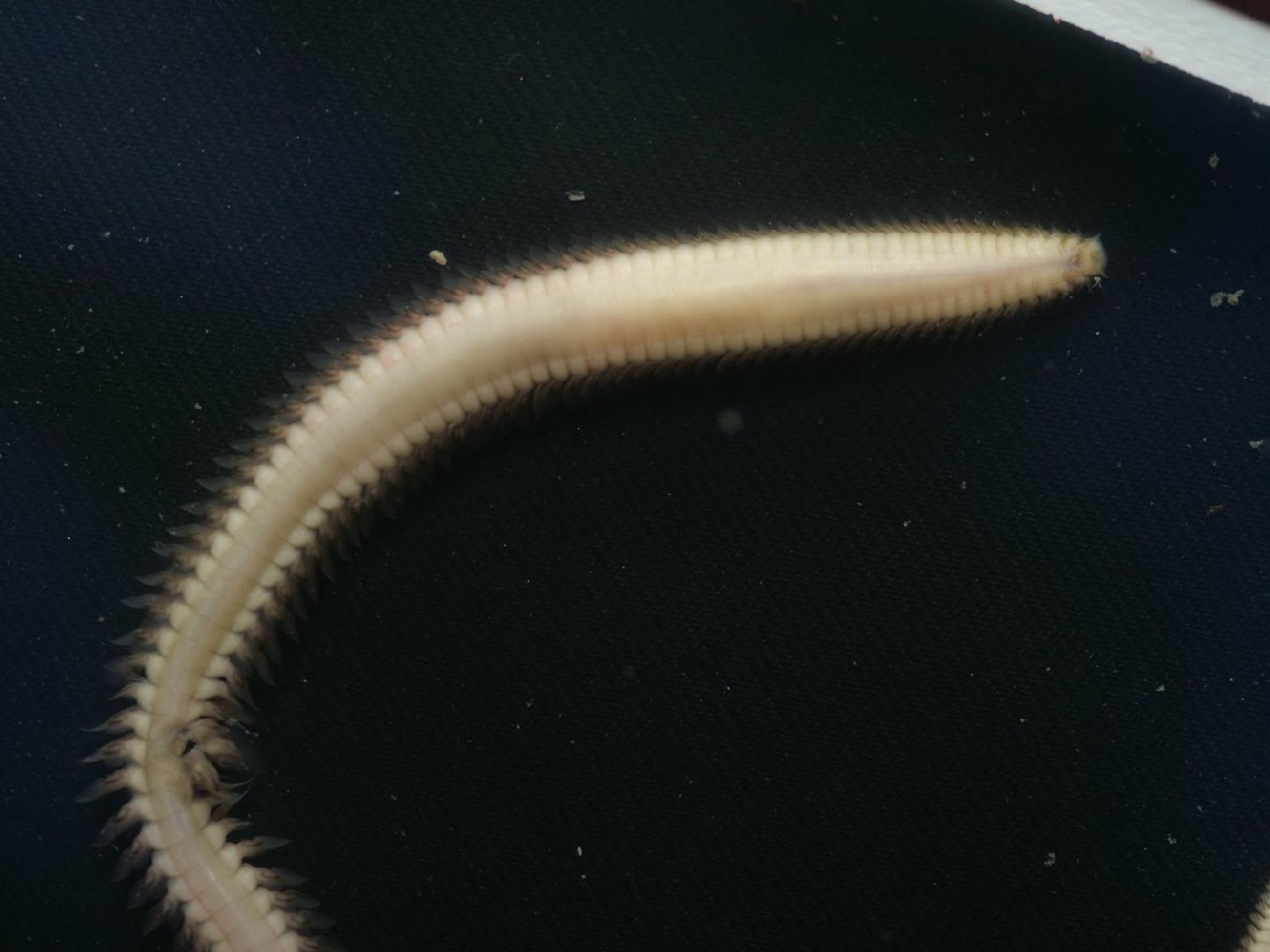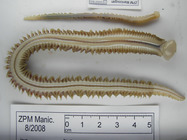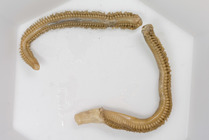WoRMS taxon details
Nephtys caeca (Fabricius, 1780)
130355 (urn:lsid:marinespecies.org:taxname:130355)
accepted
Species
Nephthys caeca (Fabricius, 1780) · unaccepted (generic spelling variant)
Nephthys hirsuta Dalyell, 1853 · unaccepted
Nephthys ingens Stimpson, 1853 · unaccepted
Nephthys margaritacea Johnston, 1835 · unaccepted
Nephthys nudipes Ehlers, 1868 · unaccepted (subjective synonym)
Nephthys oerstedii Quatrefages, 1866 · unaccepted
Nephtys bononensis Quatrefages, 1850 · unaccepted (subjective synonym)
Nephtys caeca var. ciliata McIntosh, 1908 · unaccepted (life cycle phase )
Nereis (Nephtys) lineata Dalyell, 1853 · unaccepted (superseded original combination)
Nereis caeca Fabricius, 1780 · unaccepted
Portelia caeca (Fabricius, 1780) · unaccepted (superseded recombination)
- Variety Nephtys caeca var. ciliata McIntosh, 1908 accepted as Nephtys caeca (Fabricius, 1780) (life cycle phase )
marine, brackish, fresh, terrestrial
recent only
(of Nereis caeca Fabricius, 1780) Fabricius, O. (1780). Fauna Groenlandica, systematice sistens animalia groenlandiae occidentalis hactenus indagata, quoad nomen specificium, triviale, vernaculumque, synonyma auctorum plurimum, descriptionem, locum, victum, generationem, mores, usum capturamque singuli, pro ut detegendi occasio fuit, maximaque parte secundum proprias observationes. <em>Hafniae [= Copenhagen] & Lipsiae [= Leipzig], Ioannis Gottlob Rothe.</em> xvi + 452 pp., 1 pl., available online at https://www.biodiversitylibrary.org/page/13442285 [details] 
Type locality contained in Greenlandic part of the Arctic Ocean
type locality contained in Greenlandic part of the Arctic Ocean [from synonym] [view taxon] [details]
Distribution N. caeca occurs in small numbers in a broad region parallel to the coast. lt is even more scarce in the offshore part of...
Distribution Arctic to Gulf of St. Lawrence to off Rhode Island
Distribution N. caeca occurs in small numbers in a broad region parallel to the coast. lt is even more scarce in the offshore part of the Dutch Continental Shelf, where it is only recorded from the Dogger Bank, the Cleaver Bank and the eastern part of the Oyster Ground. The species also occurs in the low intertidal zone of the Delta area and the Wadden Sea. Because of its size the biomass of N. caeca can be locally important. [details]
Distribution Arctic to Gulf of St. Lawrence to off Rhode Island
Distribution Arctic to Gulf of St. Lawrence to off Rhode Island [details]
Read, G.; Fauchald, K. (Ed.) (2024). World Polychaeta Database. Nephtys caeca (Fabricius, 1780). Accessed through: World Register of Marine Species at: https://www.marinespecies.org/aphia.php?p=taxdetails&id=130355 on 2024-11-21
Date
action
by
![]() The webpage text is licensed under a Creative Commons Attribution 4.0 License
The webpage text is licensed under a Creative Commons Attribution 4.0 License
original description
(of Nephtys bononensis Quatrefages, 1850) Quatrefages, Armand de. (1850). Études sur les types inférieurs de l'embranchement des annelés. Sur la circulation des annélides. <em>Annales des sciences naturelles, Paris.</em> Série 3, 14: 281-289., available online at https://www.biodiversitylibrary.org/page/13433728
page(s): 352-357, plate 9 figs. II-III [figures of internal anatomy] [details]
original description (of Nephthys hirsuta Dalyell, 1853) Dalyell, J. G. (1853). The Powers of the Creator Displayed in the Creation: or, Observations on Life Amidst the Various Forms of the Humbler Tribes of Animated Nature: with Practical Comments and Illustrations. Volume II. xiii + 359 pp., 46 pls. John van Voorst. London., available online at http://biodiversitylibrary.org/page/18804951 [details]
original description (of Nephthys ingens Stimpson, 1853) Stimpson, W. (1853). Synopsis of the marine Invertebrata of Grand Manan: or the region about the mouth of the Bay of Fundy, New Brunswick. <em>Smithsonian Contributions to Knowledge.</em> 6: 1-66, pls. 1-3., available online at https://www.biodiversitylibrary.org/page/32536624 [details]
original description (of Nephthys margaritacea Johnston, 1835) Johnston, George 1835. Illustrations in British Zoology. 37. Néphtys Cuvier. Magazine of Natural History, London, 8: 341-343. [details]
original description (of Nephthys nudipes Ehlers, 1868) Ehlers, E. H. (1868). Die Borstenwürmer (Annelida Chaetopoda) nach systematischen und anatomischen Untersuchungen dargestellt. <em>Wilhelm Engelmann, Leipzig.</em> 2: 269-748, plates XII-XXIV., available online at http://biodiversitylibrary.org/page/1985162 [details]
original description (of Nephthys oerstedii Quatrefages, 1866) Quatrefages, A. de. (1866 (1865)). Histoire naturelle des Annelés marins et d'eau douce. Annélides et Géphyriens. <em>Librarie Encyclopédique de Roret. Paris.</em> <b>Volume 1.</b> 1-588., available online at http://books.google.com/books?id=FV9IAAAAYAAJ [details]
original description (of Nereis caeca Fabricius, 1780) Fabricius, O. (1780). Fauna Groenlandica, systematice sistens animalia groenlandiae occidentalis hactenus indagata, quoad nomen specificium, triviale, vernaculumque, synonyma auctorum plurimum, descriptionem, locum, victum, generationem, mores, usum capturamque singuli, pro ut detegendi occasio fuit, maximaque parte secundum proprias observationes. <em>Hafniae [= Copenhagen] & Lipsiae [= Leipzig], Ioannis Gottlob Rothe.</em> xvi + 452 pp., 1 pl., available online at https://www.biodiversitylibrary.org/page/13442285 [details]
original description (of Nereis (Nephtys) lineata Dalyell, 1853) Dalyell, J. G. (1853). The Powers of the Creator Displayed in the Creation: or, Observations on Life Amidst the Various Forms of the Humbler Tribes of Animated Nature: with Practical Comments and Illustrations. Volume II. xiii + 359 pp., 46 pls. John van Voorst. London., available online at http://biodiversitylibrary.org/page/18804951
page(s): 146-147, plate XXI figs. 4-10 [details]
original description (of Nephtys caeca var. ciliata McIntosh, 1908) McIntosh, W. C. (1908). A monograph of British Annelids. <em>Ray Society of London, II. Part I. Polychaeta. Nephthydidae to Syllidae.</em> 2: 1-232., available online at http://www.archive.org/details/monographBritis2McInA
page(s): 13 [details]
context source (Deepsea) Census of Marine Life (2012). SYNDEEP: Towards a first global synthesis of biodiversity, biogeography and ecosystem function in the deep sea. Unpublished data (datasetID: 38), available online at http://www.comlsecretariat.org/wp-content/uploads/2010/06/SYNDEEP-Towards-a-first-global-synthesis-of-biodiversity-biogeography-and-ecosystem-function-in-the-deep-sea-Eva-Ramirez-Llodra-et-al..pdf [details]
context source (Schelde) Maris, T.; Beauchard, O.; Van Damme, S.; Van den Bergh, E.; Wijnhoven, S.; Meire, P. (2013). Referentiematrices en Ecotoopoppervlaktes Annex bij de Evaluatiemethodiek Schelde-estuarium Studie naar “Ecotoopoppervlaktes en intactness index”. <em>Monitor Taskforce Publication Series, 2013-01. NIOZ: Yerseke.</em> 35 pp. (look up in IMIS) [details]
context source (BeRMS 2020) Bio-environmental research group; Institute of Agricultural and Fisheries research (ILVO), Belgium; (2015): Macrobenthos monitoring in function of the Water Framework Directive in the period 2007-2009. [details]
basis of record Bellan, G. (2001). Polychaeta, <i>in</i>: Costello, M.J. <i>et al.</i> (Ed.) (2001). European register of marine species: a check-list of the marine species in Europe and a bibliography of guides to their identification. <em>Collection Patrimoines Naturels.</em> 50: 214-231. (look up in IMIS) [details]
additional source Brunel, P., L. Bosse & G. Lamarche. (1998). Catalogue of the marine invertebrates of the estuary and Gulf of St. Lawrence. <em>Canadian Special Publication of Fisheries and Aquatic Sciences, 126.</em> 405 pp. (look up in IMIS) [details] Available for editors [request]
[request]
additional source Pollock, L.W. (1998). A practical guide to the marine animals of northeastern North America. Rutgers University Press. New Brunswick, New Jersey & London. 367 pp., available online at http://books.google.com/books?id=i1AmT31cuR4C [details]
additional source Muller, Y. (2004). Faune et flore du littoral du Nord, du Pas-de-Calais et de la Belgique: inventaire. [Coastal fauna and flora of the Nord, Pas-de-Calais and Belgium: inventory]. <em>Commission Régionale de Biologie Région Nord Pas-de-Calais: France.</em> 307 pp., available online at http://www.vliz.be/imisdocs/publications/145561.pdf [details]
additional source Hartman, Olga. (1959). Catalogue of the Polychaetous Annelids of the World. Parts 1 and 2. <em>Allan Hancock Foundation Occasional Paper.</em> 23: 1-628. [details] Available for editors [request]
[request]
additional source Integrated Taxonomic Information System (ITIS). , available online at http://www.itis.gov [details]
additional source Hartmann-Schröder, G. (1996). Annelida, Borstenwürmer, Polychaeta [Annelida, bristleworms, Polychaeta]. <em>2nd revised ed. The fauna of Germany and adjacent seas with their characteristics and ecology, 58. Gustav Fischer: Jena, Germany. ISBN 3-437-35038-2.</em> 648 pp. (look up in IMIS) [details] Available for editors [request]
[request]
additional source McIntosh, W. C. (1908). A monograph of British Annelids. <em>Ray Society of London, II. Part I. Polychaeta. Nephthydidae to Syllidae.</em> 2: 1-232., available online at http://www.archive.org/details/monographBritis2McInA [details]
additional source Liu, J.Y. [Ruiyu] (ed.). (2008). Checklist of marine biota of China seas. <em>China Science Press.</em> 1267 pp. (look up in IMIS) [details] Available for editors [request]
[request]
additional source Trott, T. J. (2004). Cobscook Bay inventory: a historical checklist of marine invertebrates spanning 162 years. <em>Northeastern Naturalist.</em> 11, 261-324., available online at http://www.gulfofmaine.org/kb/files/9793/TROTT-Cobscook%20List.pdf [details] Available for editors [request]
[request]
redescription Vieitez, J.M.; M.A.; Alós, C.; Parapar, J.; Besteiro, C.; Moreira, J.; Nunez, J.; Laborda, J.; and San Martin, G. (2004). Annelida Polychaeta I. Fauna Iberica. Ramos, M.A. et al (Eds.). Museo Nacional de Ciencias Naturales, CSIC, Madrid, Vol. 25:1-530 [sections separate authorship not recognised here]. [details]
redescription Jirkov, I.A. (2001). [Polychaeta of the Arctic Ocean] (In Russian) Polikhety severnogo Ledovitogo Okeana. Yanus-K Press, Moscow, 632 pp., available online at https://www.researchgate.net/publication/259865957_Jirkov_2001_Polychaeta_of_the_North_Polar_Basin [details] Available for editors [request]
[request]
page(s): 352-357, plate 9 figs. II-III [figures of internal anatomy] [details]
original description (of Nephthys hirsuta Dalyell, 1853) Dalyell, J. G. (1853). The Powers of the Creator Displayed in the Creation: or, Observations on Life Amidst the Various Forms of the Humbler Tribes of Animated Nature: with Practical Comments and Illustrations. Volume II. xiii + 359 pp., 46 pls. John van Voorst. London., available online at http://biodiversitylibrary.org/page/18804951 [details]
original description (of Nephthys ingens Stimpson, 1853) Stimpson, W. (1853). Synopsis of the marine Invertebrata of Grand Manan: or the region about the mouth of the Bay of Fundy, New Brunswick. <em>Smithsonian Contributions to Knowledge.</em> 6: 1-66, pls. 1-3., available online at https://www.biodiversitylibrary.org/page/32536624 [details]
original description (of Nephthys margaritacea Johnston, 1835) Johnston, George 1835. Illustrations in British Zoology. 37. Néphtys Cuvier. Magazine of Natural History, London, 8: 341-343. [details]
original description (of Nephthys nudipes Ehlers, 1868) Ehlers, E. H. (1868). Die Borstenwürmer (Annelida Chaetopoda) nach systematischen und anatomischen Untersuchungen dargestellt. <em>Wilhelm Engelmann, Leipzig.</em> 2: 269-748, plates XII-XXIV., available online at http://biodiversitylibrary.org/page/1985162 [details]
original description (of Nephthys oerstedii Quatrefages, 1866) Quatrefages, A. de. (1866 (1865)). Histoire naturelle des Annelés marins et d'eau douce. Annélides et Géphyriens. <em>Librarie Encyclopédique de Roret. Paris.</em> <b>Volume 1.</b> 1-588., available online at http://books.google.com/books?id=FV9IAAAAYAAJ [details]
original description (of Nereis caeca Fabricius, 1780) Fabricius, O. (1780). Fauna Groenlandica, systematice sistens animalia groenlandiae occidentalis hactenus indagata, quoad nomen specificium, triviale, vernaculumque, synonyma auctorum plurimum, descriptionem, locum, victum, generationem, mores, usum capturamque singuli, pro ut detegendi occasio fuit, maximaque parte secundum proprias observationes. <em>Hafniae [= Copenhagen] & Lipsiae [= Leipzig], Ioannis Gottlob Rothe.</em> xvi + 452 pp., 1 pl., available online at https://www.biodiversitylibrary.org/page/13442285 [details]
original description (of Nereis (Nephtys) lineata Dalyell, 1853) Dalyell, J. G. (1853). The Powers of the Creator Displayed in the Creation: or, Observations on Life Amidst the Various Forms of the Humbler Tribes of Animated Nature: with Practical Comments and Illustrations. Volume II. xiii + 359 pp., 46 pls. John van Voorst. London., available online at http://biodiversitylibrary.org/page/18804951
page(s): 146-147, plate XXI figs. 4-10 [details]
original description (of Nephtys caeca var. ciliata McIntosh, 1908) McIntosh, W. C. (1908). A monograph of British Annelids. <em>Ray Society of London, II. Part I. Polychaeta. Nephthydidae to Syllidae.</em> 2: 1-232., available online at http://www.archive.org/details/monographBritis2McInA
page(s): 13 [details]
context source (Deepsea) Census of Marine Life (2012). SYNDEEP: Towards a first global synthesis of biodiversity, biogeography and ecosystem function in the deep sea. Unpublished data (datasetID: 38), available online at http://www.comlsecretariat.org/wp-content/uploads/2010/06/SYNDEEP-Towards-a-first-global-synthesis-of-biodiversity-biogeography-and-ecosystem-function-in-the-deep-sea-Eva-Ramirez-Llodra-et-al..pdf [details]
context source (Schelde) Maris, T.; Beauchard, O.; Van Damme, S.; Van den Bergh, E.; Wijnhoven, S.; Meire, P. (2013). Referentiematrices en Ecotoopoppervlaktes Annex bij de Evaluatiemethodiek Schelde-estuarium Studie naar “Ecotoopoppervlaktes en intactness index”. <em>Monitor Taskforce Publication Series, 2013-01. NIOZ: Yerseke.</em> 35 pp. (look up in IMIS) [details]
context source (BeRMS 2020) Bio-environmental research group; Institute of Agricultural and Fisheries research (ILVO), Belgium; (2015): Macrobenthos monitoring in function of the Water Framework Directive in the period 2007-2009. [details]
basis of record Bellan, G. (2001). Polychaeta, <i>in</i>: Costello, M.J. <i>et al.</i> (Ed.) (2001). European register of marine species: a check-list of the marine species in Europe and a bibliography of guides to their identification. <em>Collection Patrimoines Naturels.</em> 50: 214-231. (look up in IMIS) [details]
additional source Brunel, P., L. Bosse & G. Lamarche. (1998). Catalogue of the marine invertebrates of the estuary and Gulf of St. Lawrence. <em>Canadian Special Publication of Fisheries and Aquatic Sciences, 126.</em> 405 pp. (look up in IMIS) [details] Available for editors
additional source Pollock, L.W. (1998). A practical guide to the marine animals of northeastern North America. Rutgers University Press. New Brunswick, New Jersey & London. 367 pp., available online at http://books.google.com/books?id=i1AmT31cuR4C [details]
additional source Muller, Y. (2004). Faune et flore du littoral du Nord, du Pas-de-Calais et de la Belgique: inventaire. [Coastal fauna and flora of the Nord, Pas-de-Calais and Belgium: inventory]. <em>Commission Régionale de Biologie Région Nord Pas-de-Calais: France.</em> 307 pp., available online at http://www.vliz.be/imisdocs/publications/145561.pdf [details]
additional source Hartman, Olga. (1959). Catalogue of the Polychaetous Annelids of the World. Parts 1 and 2. <em>Allan Hancock Foundation Occasional Paper.</em> 23: 1-628. [details] Available for editors
additional source Integrated Taxonomic Information System (ITIS). , available online at http://www.itis.gov [details]
additional source Hartmann-Schröder, G. (1996). Annelida, Borstenwürmer, Polychaeta [Annelida, bristleworms, Polychaeta]. <em>2nd revised ed. The fauna of Germany and adjacent seas with their characteristics and ecology, 58. Gustav Fischer: Jena, Germany. ISBN 3-437-35038-2.</em> 648 pp. (look up in IMIS) [details] Available for editors
additional source McIntosh, W. C. (1908). A monograph of British Annelids. <em>Ray Society of London, II. Part I. Polychaeta. Nephthydidae to Syllidae.</em> 2: 1-232., available online at http://www.archive.org/details/monographBritis2McInA [details]
additional source Liu, J.Y. [Ruiyu] (ed.). (2008). Checklist of marine biota of China seas. <em>China Science Press.</em> 1267 pp. (look up in IMIS) [details] Available for editors
additional source Trott, T. J. (2004). Cobscook Bay inventory: a historical checklist of marine invertebrates spanning 162 years. <em>Northeastern Naturalist.</em> 11, 261-324., available online at http://www.gulfofmaine.org/kb/files/9793/TROTT-Cobscook%20List.pdf [details] Available for editors
redescription Vieitez, J.M.; M.A.; Alós, C.; Parapar, J.; Besteiro, C.; Moreira, J.; Nunez, J.; Laborda, J.; and San Martin, G. (2004). Annelida Polychaeta I. Fauna Iberica. Ramos, M.A. et al (Eds.). Museo Nacional de Ciencias Naturales, CSIC, Madrid, Vol. 25:1-530 [sections separate authorship not recognised here]. [details]
redescription Jirkov, I.A. (2001). [Polychaeta of the Arctic Ocean] (In Russian) Polikhety severnogo Ledovitogo Okeana. Yanus-K Press, Moscow, 632 pp., available online at https://www.researchgate.net/publication/259865957_Jirkov_2001_Polychaeta_of_the_North_Polar_Basin [details] Available for editors
 Present
Present  Present in aphia/obis/gbif/idigbio
Present in aphia/obis/gbif/idigbio  Inaccurate
Inaccurate  Introduced: alien
Introduced: alien  Containing type locality
Containing type locality
Unreviewed
Biology The sexes are separate and individuals breed several times over a number of years in the periods April-May and August. The larvae are planktonic. N. caeca starts reproducing in its second year of life and lives for a period of about 7 years. N. caeca is a predator moving through the top layer of the sediment in search for molluscs, crustaceans and other polychaetes. The species is eaten by juveniles of haddock and thornback (Hartmann-Schröder, 1971; Wolff, 1973; Curtis, 1977; Fauchald & Jumars, 1979; Sips, 1988; Fish & Fish, 1989; Olive & Morgan, 1991). [details]
Distribution N. caeca occurs in small numbers in a broad region parallel to the coast. lt is even more scarce in the offshore part of the Dutch Continental Shelf, where it is only recorded from the Dogger Bank, the Cleaver Bank and the eastern part of the Oyster Ground. The species also occurs in the low intertidal zone of the Delta area and the Wadden Sea. Because of its size the biomass of N. caeca can be locally important. [details]
Distribution Arctic to Gulf of St. Lawrence to off Rhode Island [details]
Habitat The species occurs in a wide variety of sediments ranging from coarse to fine muddy sand. [details]
Habitat intertidal, infralittoral and circalittoral of the Gulf and estuary [details]
Morphology A member of the family Nephtyidae that can reach a considerable size, viz. maximally 200 mm long with up to 150 segments. The head is relatively small and rectangular, with short antennae on the frontal corners giving it a T-shape. Like all nephtyids it has a large eversible, muscular proboscis with internal jaws. The first segment is reduced and bears two pairs of finger-like cirri. The rest of the body is square in cross section with prominent, powerful bilobed parapodia with curved gilis in between the lobes. The body is whitish to greenish brown, with a lightly iridescent cuticle and red gills (Hartmann-Schröder, 1971; Sips, 1988; Fish & Fish, 1989; Hayward & Ryland, 1990; Rainer, 1991). [details]
To Barcode of Life (37 barcodes)
To Biodiversity Heritage Library (21 publications) (from synonym Nephthys ingens Stimpson, 1853)
To Biodiversity Heritage Library (29 publications)
To Biodiversity Heritage Library (53 publications) (from synonym Nephthys caeca (Fabricius, 1780))
To Biological Information System for Marine Life (BISMaL)
To European Nucleotide Archive, ENA (Nephtys caeca)
To GenBank (27 nucleotides; 24 proteins)
To Global Biotic Interactions (GloBI)
To NHMUK collection (Nephtys caeca (Fabricius, 1780); NON-TYPE; NHMUK:ecatalogue:9505850)
To PESI
To The Arctic Traits Database (33 traits)
To USNM Invertebrate Zoology Annelida Collection (212 records)
To Yale Peabody Museum of Natural History (YPM IZ 072348)
To ITIS
To Biodiversity Heritage Library (21 publications) (from synonym Nephthys ingens Stimpson, 1853)
To Biodiversity Heritage Library (29 publications)
To Biodiversity Heritage Library (53 publications) (from synonym Nephthys caeca (Fabricius, 1780))
To Biological Information System for Marine Life (BISMaL)
To European Nucleotide Archive, ENA (Nephtys caeca)
To GenBank (27 nucleotides; 24 proteins)
To Global Biotic Interactions (GloBI)
To NHMUK collection (Nephtys caeca (Fabricius, 1780); NON-TYPE; NHMUK:ecatalogue:9505850)
To PESI
To The Arctic Traits Database (33 traits)
To USNM Invertebrate Zoology Annelida Collection (212 records)
To Yale Peabody Museum of Natural History (YPM IZ 072348)
To ITIS




